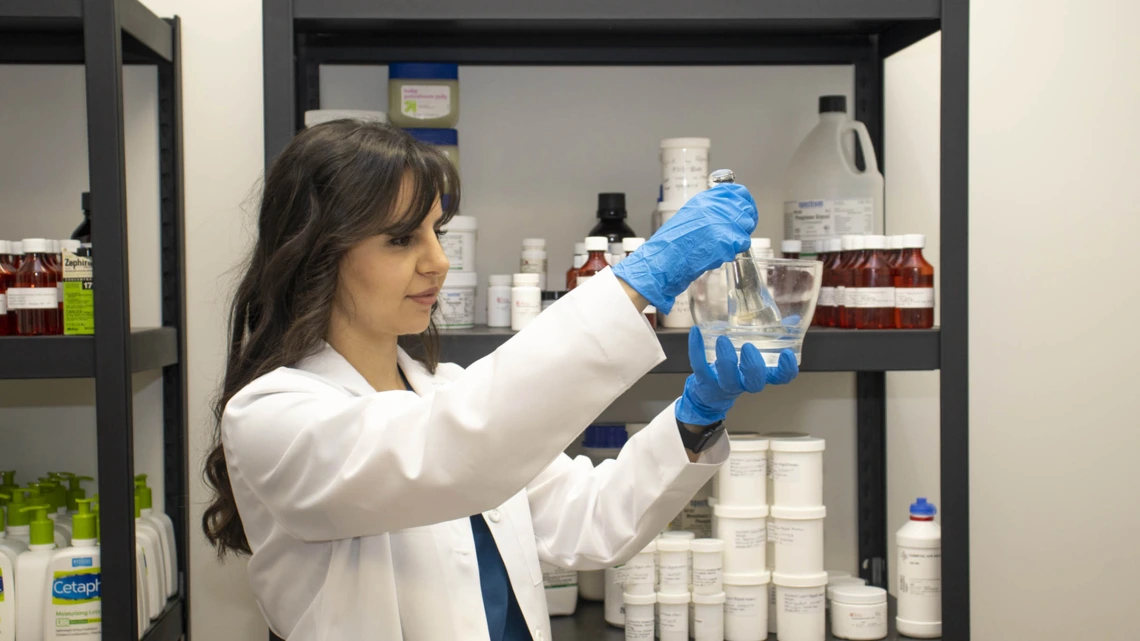R. Ken Coit College of Pharmacy Named Top 5 by AACP
Increases in research grants and contracts vault the college into the top five nationwide for pharmacy schools.

Students benefit from NIH funding through the unique opportunity of learning and training in the labs of faculty who are conducting innovative research.
More than $20 million in National Institutes of Health (NIH) grants and contracts in fiscal year 2021 propelled the University of Arizona R. Ken Coit College of Pharmacy to No. 5 in American Association of Colleges of Pharmacy (AACP) rankings.
The ranking is based on information compiled from the NIH Research Portfolio Online Reporting Tool. It includes all funded research grants awarded to principal investigators in U.S. colleges and schools of pharmacy.
“Our rise is demonstrative of our commitment to advancing the pharmaceutical sciences and ensuring current and future students gain hands-on experience from the best in our field,” said Dean Rick G. Schnellmann, PhD.
“It’s indicative of an energized, collaborative and growing research enterprise,” said Nathan Cherrington, PhD, ATS, associate dean for research in the College of Pharmacy. “The hard work of our faculty is bringing to light cutting-edge approaches to health care challenges and positioning us as a leader among our peers.”
A transformational $50 million gift from alumnus R. Ken Coit in November 2021 bolstered the college’s recent rise through the creation of six endowed chairs and four professorships. The infusion of funding has helped invigorate the research of faculty throughout the college.
A recent example of this success is Haining Zhu, PhD, professor of pharmacology and toxicology and holder of the R. Ken and Donna Coit Endowed Chair in Aging and Neurodegenerative Diseases. His NIH-funded work focuses on understanding the molecular mechanisms for neurodegenerative diseases, including amyotrophic lateral sclerosis and frontotemporal dementia, and other diseases such as cancer.
His goal is to understand how stress response pathways contribute to diseases at a molecular level. For example, nerve cells are under stress during aging and the failure to respond properly can lead to their dysfunction and death, which ultimately results in neurodegenerative diseases. His research is to learn how to fine-tune stress response pathways in nerve cells to maintain their healthy status.
Dr. Zhu said the NIH funds serve as a critical source of financial support and as a means for recruiting and retaining top talent for his lab.
The impact of NIH funding is far-reaching as students have the unique opportunity to interact with Dr. Zhu and other world-renowned researchers.
It’s the case with Rukayat Aromokeye, a second-year graduate student in the department of pharmacology and toxicology and a researcher in Dr. Zhu’s lab. She received a Young Investigator Award at the 2022 International Research Conference on Neurodegenerative Diseases in Omaha, Nebraska.
“It is a privilege to be a part of a wonderful institution with the best mentors I could ever wish for like Dr. Zhu, Gregory Thatcher, PhD, Hongmin Li, PhD, and Martha Ackerman-Berrier,” Aromokeye said.
Following graduation, Aromokeye said she hopes to contribute to more research in drug discovery and pharmacology.
The AACP represents pharmacy education in the United States and partners with the 142 schools of pharmacy across the nation to ensure quality education and training.
A version of this story was originally published by the College of Pharmacy.

